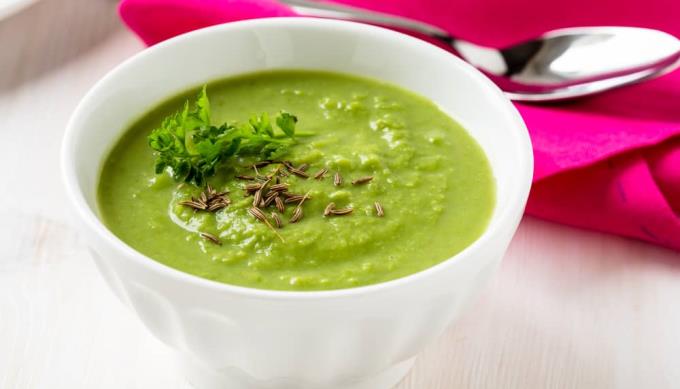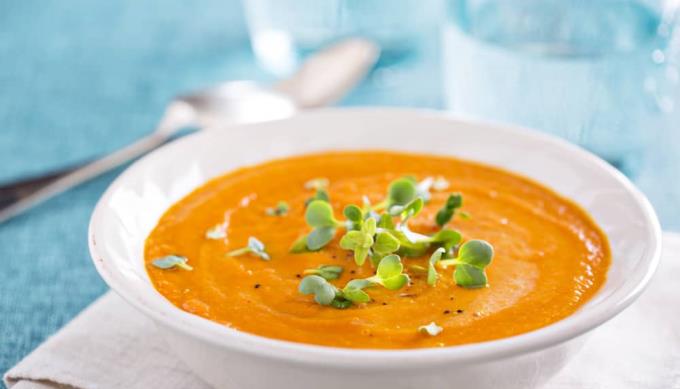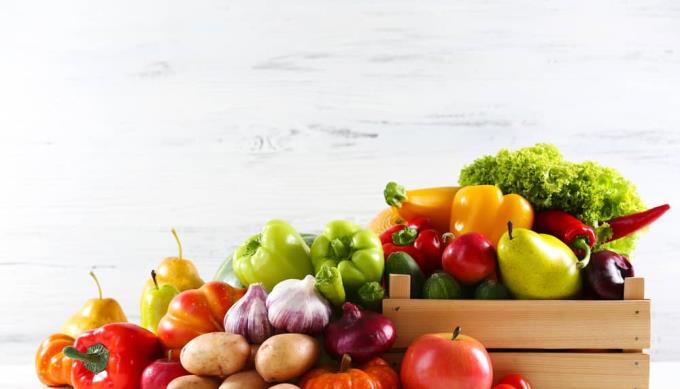Ways to determine an infants caloric needs

Learn how to determine your baby’s caloric needs, including the calories in breast milk and formula, to ensure your infant gets the right nutrition for healthy growth.
Your baby is in the weaning stage, so in order for your baby to develop comprehensively, be healthy and gain weight steadily, you need to learn some ways to cook porridge for 8-month-old babies very nutritious and scientific.
8 months of age is an extremely important period for your baby's development. At this stage, mothers need to pay special attention to nutrition to ensure that the baby is provided with all the essential nutrients for comprehensive physical and intellectual development. Meal development and weaning menus are the two "golden factors" that you need to do. To do this, you should immediately refer to some very simple 8-month-old porridge cooking tips through the following sharing of aFamilyToday Health.
Here are some ways to cook porridge for babies 8 months old that are both delicious and nutritious:
To cook this porridge, you need to prepare:
Porridge, rice flour: 4 tablespoons
Squash (peeled, seeded, minced): 1 tablespoon
Lean pork, minced): 1 tablespoon
Cooking oil for babies: 1 tablespoon
Fish sauce
1 cup water (if using rice flour)
Processing
Boil the meat mixture with water, then add the squash. Cook until the squash softens, then bring it down and let it cool down. Mix in flour / porridge, add cooking oil, add a few drops of fish sauce (if necessary), mix well, let it cool down and let your baby enjoy.
Note: Mom can put a few drops of fish sauce into your baby's porridge. However, for babies under 1 year old , mothers should not add salt or fish sauce to baby food. The reason is that the milk, vegetables, meat ... that the child eats has provided the amount of salt that the child needs.

To make this porridge for babies 8 months, you need to prepare:
Lean beef: 10g
Rice: 20g
Moringa: 20g
Broth: 200ml
Olive oil for babies to eat: 1 tablespoon
Processing
The rice is washed, soaked for about 30 minutes until the rice is soft, then put in a pot with 200ml of broth and simmer until the rice is cooked.
Lean beef, washed, minced or minced and marinated with 1/2 teaspoon of olive oil. Then, place the pan on the stove and stir the beef.
Moringa washed under running water, sprinkled, plucking leaves, soaked with diluted salt water then picked out and put in a blender puree.
When the porridge is tender, put the beef, moringa in the porridge, stir well, boil a little more, then turn off the heat. Ladle the porridge into a cup and wait until the porridge is warm, feed the baby.
Materials need to prepare:
Porridge / rice flour: 4 tablespoons
Mushroom (minced): 1 tablespoon
Lean pork, minced: 1 tablespoon
Cooking oil for babies: 1 tablespoon
Water (if using rice flour): 1 cup
Processing
Mushrooms cut the legs, shaved, poured over boiling water, then minced.
Add the pork and cook with water or porridge, then cook the mushrooms. If the porridge is boiled, let it cool down, add oil, stir well and let your baby enjoy.
Ingredients to make this 8-month baby porridge include:
Rice: 50g
Salmon fillet: 20g
Dried onion, green onion, garlic
Cheese type for babies
Olive oil for babies to eat
Processing
Rice is washed, soaked in water to soften and then put in a rice cooker simmered.
Before preparing fish, you should check to see if the salmon fillet is still bones, then wash it with lemon or fresh milk to remove the fishy smell, then rinse with cold water to clean, drain and then mince. puree or steamed.
Dried onions, peeled and chopped garlic; Picked scallions, washed, chopped fine fibers.
North the pan on the stove, add a little olive oil to heat, then add the onion, minced garlic to fry. Then, pour the fish into the island evenly.
Next, add the salmon meat to the porridge pot and stir well for 3-5 minutes, then turn off the heat, add cheese to stir. Note that not giving cheese while the porridge is boiling will not be good for your baby's health. Spoon the porridge into a cup and feed it while it is still warm.

Materials need to prepare:
Porridge / rice flour: 4 tablespoons
Carrots (boiled, puree): 1 tablespoon
Fresh lean fish (steamed, minced): 1 tablespoon
Cooking oil: 1 tablespoon
Water (if using rice flour): 1 cup
Processing
Pour the dough into warm water and stir until smooth. Mix fish, carrot, water ball, cooking oil into prepared flour (or porridge) and let your baby enjoy.
Materials need to prepare:
Porridge / rice flour: 4 tablespoons
Choy sum (minced): 1 tablespoon
Pork (lean, minced): 1 tablespoon
Cooking oil: 1 tablespoon
Fish sauce
Water (if using rice flour): 1 cup
Processing
Put the pork in the water, put it on the stove to cook until tender. Next, you add the choysum and cook it softly, let it sit down to reduce the heat. Mix in porridge or flour, add cooking oil and fish sauce and let your baby enjoy.
Making porridge with bone broth, giving your baby a lot of potatoes, carrots or pureed foods for too long ... are serious mistakes that slow your baby's weight gain:
Many mothers everyday use bone broth to cook porridge for their children because they think that the nutrients from the bones will dissolve in the water and their babies fully absorb these nutrients. However, the use of bone broth to cook for your baby only has the effect of creating sweetness and aroma. The proteins are still in the flesh and bones. Therefore, children should eat both body and water to prevent malnutrition due to lack of nutrients.
If you overdo the blender while preparing food for your baby, it will make your child depend on them again, even up to 3 - 4 years old, have full teeth and still have to eat pureed food because every pig is eaten. vomiting or vomiting. Not only that, eating pureed foods for too long also causes children to have no chewing reflexes, the gastric juice is not stimulated, so they do not feel the taste of the food, have no feeling of eating.
To avoid this, you should practice feeding your child the right foods in each child's time. When the child is 6 months old , practice to eat thin powder and thicken, for 7 - 8 months to eat pureed porridge or solid flour, for 12 months, practice with cooked porridge with seeds and soft foods such as pho, vermicelli ...

Due to their busy work, many parents tend to buy processed nutritious porridge for their children to eat on the sidewalk. In addition, some people like to buy nutritious porridge just because they are addicted to this dish, not because they do not have time to prepare.
Many children who eat nutritious porridge bought from the street often do not gain weight due to insufficient quality porridge. Some children have to go to hospital because of vomiting and diarrhea because porridge does not ensure food hygiene and safety. Therefore, to ensure the healthy and comprehensive development of your child, you should take the time to cook porridge for your baby, if you must use it, add cooking oil, meat, fish or eggs to the porridge before feeding the baby.
Medical experts also warn that eating too much salt can lead to high blood pressure, heart attack, stroke, and also the cause of many health consequences. Young children have a much better taste than adults, so when tasting food for children, you need to wedge lighter than usual. In addition, you should also avoid giving your child too much processed foods such as crispy chips, snacks, fast foods, canned foods ... to avoid getting too much salt into the body.
Due to being busy, the baby does not eat much each meal, so many mothers tend to cook a large pot of porridge, reheat it many times to feed the baby. However, doing so will not retain the nutrients. When you reheat once and then twice, most of the vitamins and minerals in the foods will be lost and have a bad taste. Not only that, children will also be fed up with eating 3 meals with the same taste.
8 months is the time when the baby's nutritional needs have increased significantly. At this time, the minimum amount of nutrition that your baby needs each day is about 500ml of milk and 3 meals or porridge (about 200ml each). With the above amount of food, each day, you should feed your baby 2-3 meals, the baby's weaning meals can include main meals and mix more snacks.
In terms of nutrition, you need to make sure your baby receives 4 groups of substances such as proteins, glucides, lipids, vitamins and minerals. According to nutrition experts, every day babies need to eat about:
Meat / shrimp / fish: 50 - 60g
White non-glutinous rice: 50 - 60g
Vegetables and fruits: 50 - 60g
Oil / grease: 15g
In addition, you also need to feed your baby a lot of green vegetables and fruits because these are easy to digest foods and provide a number of nutrients such as carbohydrates, proteins, vitamin A, vitamin C, fiber ... These are Nutrients are essential for holistic and healthy development in infants and young children.
When offering solids, it is important that you schedule breakfast, lunch and dinner in a scientific way to help your child get used to meal times and meals. Feed your baby 2-3 main meals a day and include snacks (can be fruit, whey or yogurt ...):
Children from 4 - 6 months old should eat 2 meals a day, each meal 2 - 4 teaspoons of food.
Babies aged 7-12 months should eat 3 meals a day, with the right amount of food by holding their hands.
A scientific diet for 8-month-olds will include foods rich in carbohydrates, proteins, vitamins and minerals:
Fruits contain a lot of vitamins, minerals and other micronutrients. In addition to the usual fruits such as banana, papaya, watermelon, melon, apple ... you can also feed your baby some fruits such as kiwi, strawberries, peaches ... When you feed your baby, you can Grate or cut into many different shapes to make your baby feel interested.

By the time your baby is 8 months old, you can switch from giving your baby puree to chopped vegetables and incorporating a variety of vegetables into your baby's diet. At this age, you can feed your baby cauliflower, broccoli, asparagus, green beans and pumpkins ...
Fish is very nutritious food for children 8 months old. Fish like tuna, salmon ... are rich in omega-3 fatty acids, a nutrient very good for growth and brain development for children. You can let your child eat steamed fish with puree mixed with porridge or soup.
Chicken is considered one of the healthiest foods for children. You can start offering these foods when your baby is 7 months old. In addition to chicken, you can also use chicken broth to cook porridge or soup for your baby.
Cheese is an excellent source of calcium for growing children. You can use a variety of cheeses to make baby snacks. However, you should avoid overfeeding as it can cause stomach upset.
Eggs are a very healthy food because they are loaded with good fats and proteins. However, some babies may be allergic to eggs, so when feeding your baby, you need to pay close attention to see if your baby shows signs of an allergy. Note that when you first feed your baby, you should only feed your baby a moderate amount and observe the baby's reaction.
Yogurt is also a very good food for babies 8 months old. Because this food not only provides good bacteria for the intestine but also gives the body a lot of essential vitamins and minerals.
Learn how to determine your baby’s caloric needs, including the calories in breast milk and formula, to ensure your infant gets the right nutrition for healthy growth.
Discover the top 5 smartest dog breeds in the world, including Border Collie, Poodle, German Shepherd, Golden Retriever, and Doberman Pinscher. Learn about their unique traits and why they are considered the most intelligent dogs.
Discover 7 nutritious and delicious ways to cook egg porridge for babies, including recipes with cheese, pumpkin, tomato, and more. Learn how to prepare baby-friendly egg porridge with our expert tips.
After a series of medical measures they obtained a complete human vascular system profile.
Watermelon is one of the fruits that many people love, not only cheap but also delicious, nutritious and refreshing in the summer. To get delicious watermelon pieces, show off your housewives, your artistic talents to cut beautiful pieces of watermelon.
aFamilyToday Health - The digestive system and body in each baby is different. Parents need to recognize notes to deal with when babies have a food allergy!
Babies need many factors for perfect development. aFamilyToday Health shares with parents things to keep in mind when babies are 8 weeks old so that parents can take care of their babies the best!
Babies need many factors for perfect development. aFamilyToday Health shares with parents things to keep in mind when babies are 18 weeks so that parents can take care of their babies the best!
Babies need many factors for perfect development. aFamilyToday Health shares with parents things to keep in mind when babies are 28 weeks old so that parents can take care of their babies the best!
Babies need many factors for perfect development. aFamilyToday Health shares with parents things to keep in mind when babies are 32 weeks old so that parents can take care of their babies the best!








